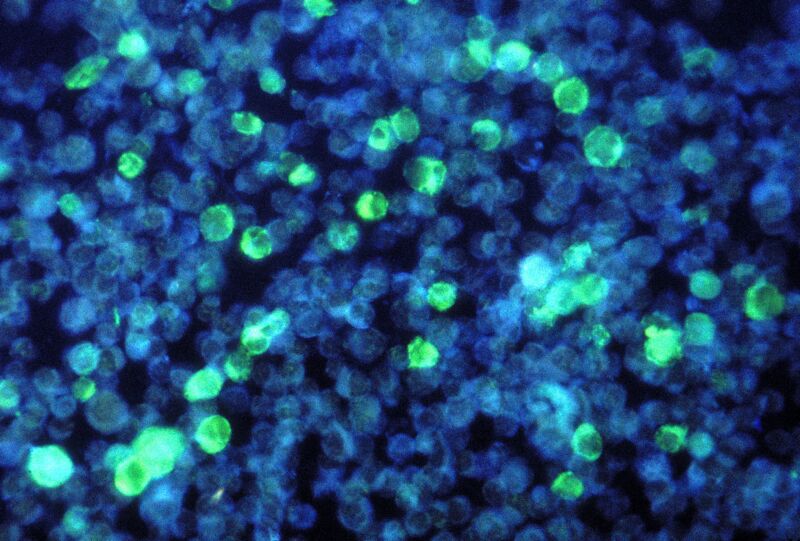Evidence is mounting that a garden-variety virus that sometimes causes mono in teens is the underlying cause of multiple sclerosis, a rare neurological disease in which the immune system attacks the brain and spinal cord, stripping away protective insulation around nerve cells, called myelin.
It's still unclear how exactly the virus—the Epstein-Barr virus (EBV)—may trigger MS and why MS develops in a tiny fraction of people. About 95 percent of adults have been infected with EBV, which often strikes in childhood. MS, meanwhile, often develops between the ages of 20 and 40 and is estimated to affect around one million people in the US. Yet, years of evidence have consistently pointed to links between the childhood virus and the chronic demyelinating disease later in life.
With a study published today in Science, the link is stronger than ever, and outside experts say the new findings offer further "compelling" evidence that EBV isn't just connected to MS; it's an essential trigger for the disease. The study found, among other things, that people had a 32-fold increase in risk of developing MS following an EBV infection in early adulthood.
"It's a great paper," Dr. Ruth Dobson, a preventive neurology professor and MS expert at Queen Mary University of London, told Ars in an interview. "The evidence just adds up and adds up and adds up… Whilst we don't understand biologically how EBV drives MS and we think about causation theories, really we have the rest of the building blocks in place," said Dobson, who was not involved in the new Science study. "It's another piece of evidence that really solidifies this theory" that EBV triggers MS.
New findings
For the study, researchers led by Harvard neuroepidemiologist Dr. Kjetil Bjornevik mined an exceptionally rich repository of blood serum samples taken from a cohort of more than 10 million active-duty military personnel between 1993 and 2013. The samples were taken from relatively healthy, fit, and young military personnel in the course of standard screenings for infections, particularly HIV.
In the cohort, there were 801 members who developed MS and had banked up to three serum samples prior to their diagnosis. This gave the researchers the unique opportunity to go back in time and examine serum samples from MS patients years before they developed the disease. The researchers could also compare samples from the 801 MS patients to samples from 1,566 cohort members who did not develop MS and could serve as controls.
Of the 801 people who developed MS, all but one had antibodies indicating an EBV infection by the time of their MS diagnosis. And most of those EBV infections occurred earlier in their lives. At the start of the 20-year period, only 35 of the 801 MS patients started out as negative for EBV. By the end of the period, 34 of those 35 developed anti-EBV antibodies—aka seroconverted—prior to their diagnosis.
Bjornevik and colleagues compared those 35 initially EBV-negative personnel with 107 control-group members who also initially tested negative. They found that the rate of seroconversion in the 35 who would go on to develop MS was significantly higher than the rate in the control group—97 percent of the 35 seroconverted prior to diagnosis while only 57 percent of the control group seroconverted during the 20-year period. From that data, the researchers calculated that those who seroconverted had a 32-fold increased risk of developing MS.
It's unclear why the one MS patient did not appear to seroconvert during the study. The authors speculate that, given gaps in sampling, it's possible the person did seroconvert between the last sample and the diagnosis. It's also possible that the person was misdiagnosed with MS or was infected with EBV but for some reason didn't seroconvert. It's also possible that the person had a rare type of MS that was triggered by something besides EBV. Regardless, the authors reasoned that the one outlying case didn't weaken the strong connection between MS and EBV.
But EBV wasn't the only virus the researchers scrutinized. In fact, they screened serum samples for antibodies targeting more than 200 viruses. The screening indicated that the risk of MS did not increase following infection with any other virus besides EBV. Moreover, when the researchers compared the overall antiviral antibody responses in MS patients to those in controls, they found the overall antibody responses were similar. This suggests that there wasn't some sort of underlying immune dysregulation that spurred the development of MS after an EBV infection.



3175x175(CURRENT).thumb.jpg.b05acc060982b36f5891ba728e6d953c.jpg)
Recommended Comments
There are no comments to display.
Join the conversation
You can post now and register later. If you have an account, sign in now to post with your account.
Note: Your post will require moderator approval before it will be visible.